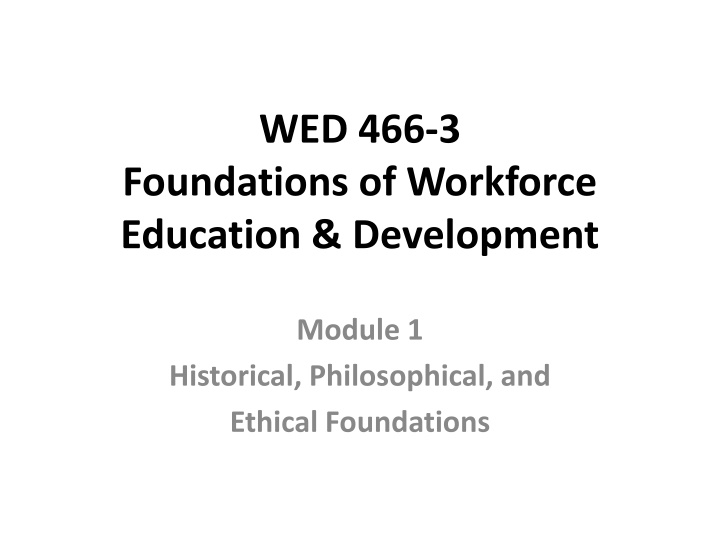
Historical Foundations of Workforce Education and Development
Explore the historical, philosophical, and ethical foundations of workforce education and development in America, tracing back to early career and technical education initiatives post-Revolutionary War. Dive into key movements, reforms, and educational philosophies shaping the landscape, including the role of the GI Bill and the influence of notable figures like Dewey and Prosser.
Download Presentation

Please find below an Image/Link to download the presentation.
The content on the website is provided AS IS for your information and personal use only. It may not be sold, licensed, or shared on other websites without obtaining consent from the author. If you encounter any issues during the download, it is possible that the publisher has removed the file from their server.
You are allowed to download the files provided on this website for personal or commercial use, subject to the condition that they are used lawfully. All files are the property of their respective owners.
The content on the website is provided AS IS for your information and personal use only. It may not be sold, licensed, or shared on other websites without obtaining consent from the author.
E N D
Presentation Transcript
WED 466-3 Foundations of Workforce Education & Development Module 1 Historical, Philosophical, and Ethical Foundations
Learning Objectives Historical Development of Public Sector Workforce Education . . . of Private Sector Workforce Education Role and Contributions of the GI Bill Philosophical and Ethical Issues
Early Career and Technical Education in America Family and Churches Post-Revolutionary War Church Schools and Academies for the Wealthy Felt Need U.S. Constitution? Boston: Primary School System and a H.S. Massachusetts Law: Towns to fund H.S.s Apprenticeships Beginnings of Universal Education Colonial Governments Benjamin Franklin
Early Educational Movements Mechanical Institutes Land-Grant Act 1862 American Lyceum Trade Schools, post 1865 Manual Labor Corporate Schools Technical Schools
. . . Continued Educ. Reforms in the Elementary Schools Teacher Training, textbooks and lesson planning (Normal Schools) Manual Training Washington U (St. Louis) M.I.T. Special Manual Training Schools Become Technical Schools Child-Centered Curriculum Kindergarten
. . . Continued Passage of Compulsory School Laws H.S. Douglas Commission of Massachusetts Basic Education Classical for College- bound Students 1913 NEA Commission called for creation of the Comprehensive HS and Intermediate or Junior HS Practical Natl. Soc. for the Promotion of Indus. Educ. 1906
. . . Continued - Movements to Include Practical Subjects in HS Industrial Arts American Sloyd Agricultural Education, Home Economics, and General Business Educ. Arts & Crafts Correspondence Comm. On Natl. Aid to Voc. Education, 1914 led to Smith-Hughes Act, 1917 Manual Arts
Educational Philosophies of Dewey and Prosser 20thCentury John Dewey Democratic & Practical Manner: Equalize Individual Differences to Improve Rapidly Changing Society; Promote Personal Initiative & Adaptability Charles Prosser Democratic & Practical Manner: Develop Interest, Needs, & Aptitudes to Perpetuate Society Basis of Smith-Hughes
Servicemens Readjustment Act of 1944 Role of the Federal Government? Effects? On Colleges and Universities? Campus Living and Activities? Individual Lives? Society? Vocational Education?
Philosophical Influences on Education Idealism Realism 1. What should We Teach? Pragmatism 2. How Should We Teach? Existentialism
Professionalism & Ethics Four Ethical Obligations 1. Promote Learning 2. Ensure Health & Safety 3. Protect the Public or Private Trust 4. Promote the Transfer of Learning
. . . Continued True or False? Invariably, workforce education professionals will encounter ethical conflicts in their careers?
